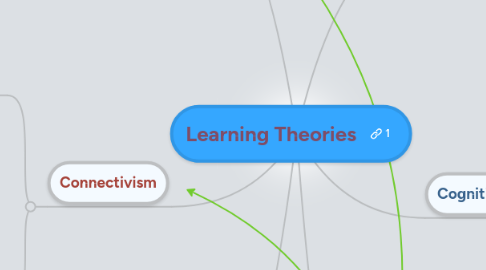
1. Connectivism
1.1. Basics:
1.1.1. New learning theory, from 2006, for the digital age
1.1.2. Learning is the process of creating connections with others and developing a network
1.1.3. Knowledge can be located along many points of the network, and can be distributed and collected to others in the network
1.1.4. Learning consists of being capable of constructing the network and then connecting with others to gain information
1.2. Implications:
1.2.1. Having a well connected network allows for up to date knowledge to be found
1.2.2. As knowledge in specialty areas is constantly growing and changing, having access in the classroom to up to date information can lead to more accurate outcomes
1.2.3. Students and teachers have a greater opportunity to see differing opinions and could therefore provide unbiased arguments or outcomes
2. Technology Learning Theories
2.1. Media Ecology
2.1.1. Basics:
2.1.1.1. Marshall McLuhan - "The medium IS the message"
2.1.1.2. People are influenced by technology (the medium: tv, internet, news, tabloids, etc.)
2.1.1.3. Peoples ideas and values can change as technology advances or changes
2.1.2. Implications:
2.1.2.1. The technology used in the classroom will influence what and how students learn
2.2. Social Construction of Technology (SCOT)
2.2.1. Basics:
2.2.1.1. People influence technology
2.2.1.2. Technology changes and adapts to the people and the culture
2.2.2. Implications:
2.2.2.1. The culture of the classroom, and the knowledge the teacher and students have, determine what technology will be best utilized in the classroom
3. TPACK
3.1. Basics:
3.1.1. Different types of knowledge a teacher must have
3.1.1.1. Content Knowledge
3.1.1.2. Pedagogical Knowledge
3.1.1.3. Technological Knowledge
3.1.2. Combinations of the three knowledge areas lead to better learning
3.2. Implications:
3.2.1. A teacher who has a better grasp at Content, Pedagogical, and Technological Knowledge know technology's role in what to teach and how to teach it
3.2.2. Lessons will be more interesting and well-rounded with an even amount of knowledge provided in all three areas
4. Constructivism
4.1. Basics:
4.1.1. The mind is like a network
4.1.2. Learning is done by building new connections by actively interacting with the environment
4.1.3. Connections are made based on prior knowledge
4.2. Implications:
4.2.1. The teacher must accurately detail or explain each step of a complex project for students to be
4.2.2. The teacher is like a facilitator for students, rather than lecturer
4.2.3. The teacher must understand what students already know and scaffold them in what they are learning
5. Cognitive Load
5.1. Basics:
5.1.1. Part of Cognitivist Theory
5.1.2. Prior knowledge is the key to learning
5.1.3. The brain is like a computer, processing information based
5.1.4. Too much information at once can lead to overloading working memory
5.1.5. Not enough or already known information can lead to under loading working memory
5.2. Implications:
5.2.1. A teacher should understand how much students already know, so as not to reteach information leading to attention defecits
5.2.2. A teacher should also not provide too much information, facts, or details to learn at once, or else students will easily forget
6. Philosophy of Teachnology
6.1. Basics:
6.1.1. A teachers personal philosophy on using technology in the classroom
6.1.2. A teacher's belief on the effectiveness of technology for teaching and learning
6.2. Implications:
6.2.1. How a teacher feels about technology will affect the types of technology they use, and it will affect how students learn in their classroom.
